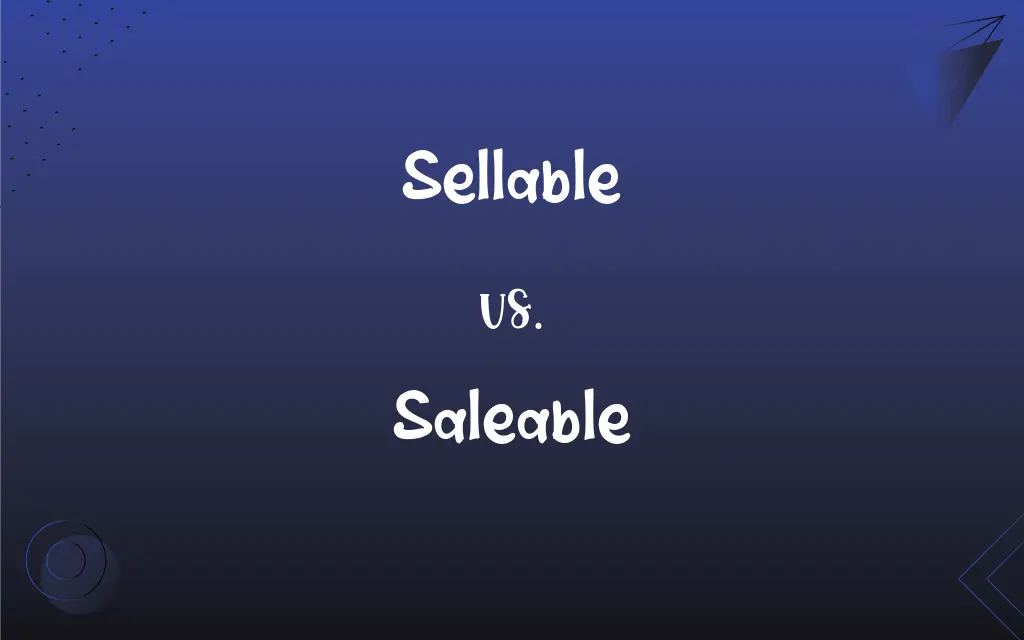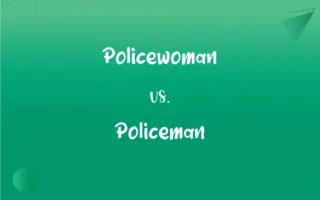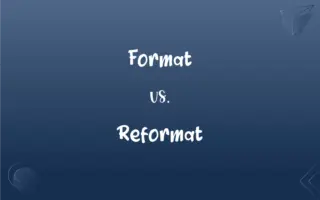Sellable vs. Saleable: What's the Difference?
Edited by Aimie Carlson || By Janet White || Updated on November 10, 2023
"Sellable" and "saleable" both mean capable of being sold, but "sellable" is more common in American English, while "saleable" is preferred in British English.

Key Differences
"Sellable" and "saleable" are often used interchangeably in English to describe items that can be sold. "Sellable" is more frequently used in American English, emphasizing the potential to sell something. In contrast, "saleable" is preferred in British English, focusing on the marketability of an item.
When considering marketability, "sellable" implies that an item is attractive to buyers due to its features or demand. "Saleable," on the other hand, may suggest that the item meets certain standards or qualifications making it fit for sale.
In terms of usage, "sellable" is often chosen in casual and business conversations in the U.S. "Saleable," however, appears more in formal or legal contexts, particularly in the UK, indicating compliance with sale requirements.
The choice between "sellable" and "saleable" can also be influenced by the industry. In technology and entertainment, "sellable" is more prevalent, while "saleable" is common in legal, real estate, and academic settings.
In digital communication and marketing, "sellable" is more likely to be used, aligning with American English's dominance in these fields. Conversely, "saleable" is more often found in traditional print mediums, especially in British publications.
ADVERTISEMENT
Comparison Chart
Preferred Usage
More common in American English
More common in British English
Implication
Focuses on potential to sell
Suggests marketability and compliance
Contextual Preference
Often used in casual, business, tech sectors
Preferred in formal, legal, real estate
Industry Relevance
Prevalent in technology, entertainment
Common in academia, legal discussions
Digital vs. Print
Favored in digital communication
Found more in traditional print mediums
ADVERTISEMENT
Sellable and Saleable Definitions
Sellable
Capable of being sold.
The unique design made the product highly sellable.
Saleable
Likely to be sold or profitable.
The saleable merchandise was quickly stocked in stores.
Sellable
Marketable or attractive to buyers.
Her sellable skills landed her the job immediately.
Saleable
Fit for sale or capable of being sold.
The antiques were deemed saleable by the expert.
Sellable
Likely to be sold or to make a sale.
The sellable artwork drew many collectors to the gallery.
Saleable
Marketable or appealing to potential buyers.
His novel was considered highly saleable by the publisher.
Sellable
Valuable or desirable in the market.
The sellable location of the house increased its price.
Saleable
Meeting the standards necessary for selling.
The produce was fresh and saleable.
Sellable
Suitable for sale, especially in terms of quality.
The refurbished phones were considered sellable.
Saleable
Attractive in the marketplace due to quality or demand.
The saleable location of the apartment made it a hot commodity.
Sellable
To exchange or deliver for money or its equivalent
We sold our old car for a modest sum.
Saleable
Variant of salable.
Sellable
To offer or have available for sale
The store sells health foods.
Saleable
Suitable for sale; marketable; worth enough to try to sell.
Sellable
To give up or surrender in exchange for a price or reward
Sell one's soul to the devil.
Saleable
Something that can be sold.
Saleable
See Salable, Salably, etc.
Saleable
Possible to sell
FAQs
Can "sellable" and "saleable" be used interchangeably?
Generally, yes, though regional preferences may apply.
Is "saleable" used more in formal contexts?
Yes, it's often used in legal, real estate, and academic settings.
Is "sellable" the same as "saleable"?
Yes, both mean capable of being sold, but usage varies between American and British English.
Are there industries where "sellable" is preferred?
Yes, "sellable" is more common in technology and entertainment sectors.
Is "sellable" more common in American English?
Yes, "sellable" is more frequently used in American English.
Is "saleable" frequently used in British publications?
Yes, especially in traditional print mediums.
Does "saleable" imply legal or market standards?
Yes, "saleable" often suggests compliance with market or legal standards.
Can "saleable" refer to compliance with selling requirements?
Yes, it can indicate something meets the requirements for sale.
Are both "sellable" and "saleable" adjectives?
Yes, both are adjectives describing the potential to be sold.
Does "sellable" imply market attractiveness?
Yes, it often means something is attractive to buyers.
Can "sellable" refer to skills or services?
Yes, it can refer to skills or services that are marketable.
Does "saleable" suggest an item is profitable?
Yes, it can mean an item is likely to be sold or is profitable.
Can "sellable" be used to describe personal attributes?
Yes, such as in reference to marketable skills or qualities.
Is "sellable" suitable for describing technological products?
Yes, especially regarding their market appeal.
Is "sellable" used in digital marketing?
Yes, it's common in digital communication and marketing.
Can "sellable" be used for property?
Yes, it can describe property that is attractive to buyers.
Does "sellable" relate to market trends?
Yes, it often aligns with current market demands or trends.
Does "saleable" apply to literary works?
Yes, in terms of marketability or publishing standards.
Is "saleable" appropriate for describing art?
Yes, especially if the art meets certain market standards.
Can "saleable" describe agricultural products?
Yes, particularly in terms of market readiness or standards.
About Author
Written by
Janet WhiteJanet White has been an esteemed writer and blogger for Difference Wiki. Holding a Master's degree in Science and Medical Journalism from the prestigious Boston University, she has consistently demonstrated her expertise and passion for her field. When she's not immersed in her work, Janet relishes her time exercising, delving into a good book, and cherishing moments with friends and family.
Edited by
Aimie CarlsonAimie Carlson, holding a master's degree in English literature, is a fervent English language enthusiast. She lends her writing talents to Difference Wiki, a prominent website that specializes in comparisons, offering readers insightful analyses that both captivate and inform.































































